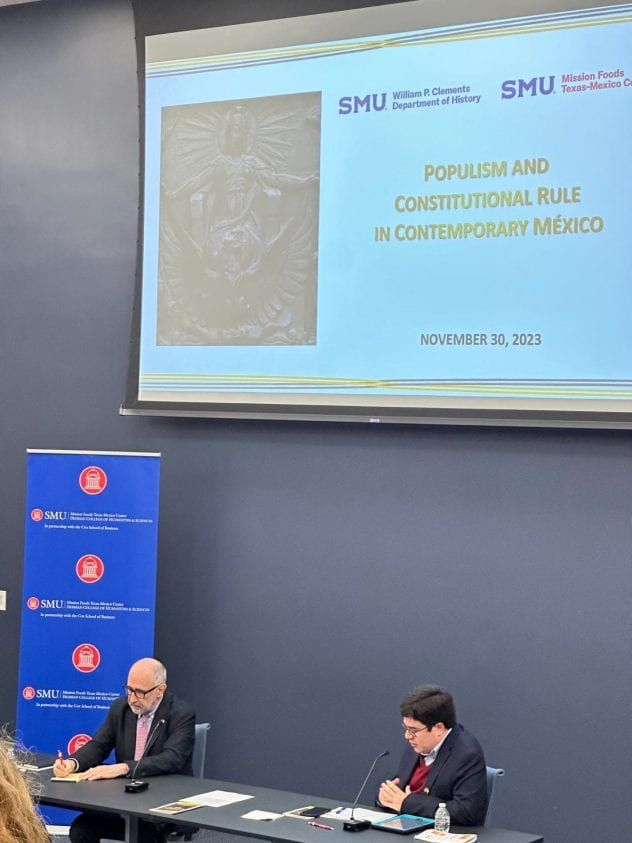Populism and Constitutional Rule in Contemporary Mexico event
In collaboration with the William P. Clements Department of History, the Mission Foods Texas-Mexico Center hosted a program featuring former Justice of the Supreme Court of Mexico José Ramón Cossío Díaz, shedding light on the critical issues of populism and constitutional governance in contemporary Mexico.
 During the conference, Justice Cossío delved into an insightful analysis of President Andrés Manuel López Obrador’s actions and their consequential effects, particularly emphasizing the president’s ascent to power. An overarching concern emerged regarding President Obrador’s apparent intentions to tamper with existing laws and the potentially adverse impact of his policies on Mexico. Notably, the former justice mentioned how Obrador’s approach leans towards centralizing power, fostering a more authoritarian system that consolidates control within the executive branch while simultaneously diminishing the influence of other political entities in Mexico.
During the conference, Justice Cossío delved into an insightful analysis of President Andrés Manuel López Obrador’s actions and their consequential effects, particularly emphasizing the president’s ascent to power. An overarching concern emerged regarding President Obrador’s apparent intentions to tamper with existing laws and the potentially adverse impact of his policies on Mexico. Notably, the former justice mentioned how Obrador’s approach leans towards centralizing power, fostering a more authoritarian system that consolidates control within the executive branch while simultaneously diminishing the influence of other political entities in Mexico.
Justice Cossío expressed specific worries about President Obrador’s initiatives, such as the proposed elimination of Mexico’s National Electoral Institute, INE for its acronym in Spanish, the citizen-run entity in Mexico responsible for overseeing free and fair elections. Obrador’s efforts to dismantle INE are raising alarms among different sectors of Mexico’s population, since they feel this is another step in the erosion of democratic processes under his leadership.
Towards the conclusion of his presentation, Justice Cossío underscored his apprehension regarding Mexico’s future and security, especially in the context of the upcoming 2024 Mexican presidential election. He highlighted the indirect influence wielded by President Obrador through his party and the undermining of INE, creating an environment of uncertainty and potential challenges to the integrity of the electoral process.
upcoming 2024 Mexican presidential election. He highlighted the indirect influence wielded by President Obrador through his party and the undermining of INE, creating an environment of uncertainty and potential challenges to the integrity of the electoral process.
Justice Cossío’s particular concern is President Obrador’s decision to slowly militarize the country, granting the military authority over aspects like civil engineering projects, appointments in academic entities, and other non-military activities. Justice Cossío and other Mexican scholars and jurists view this as problematic since it raises questions about accountability and transparency. The military’s involvement in these projects renders their actions as classified information, further complicating efforts to ensure openness and responsibility in governing the nation.

0 comments on “Populism and Constitutional Rule in Contemporary Mexico event” Add yours →